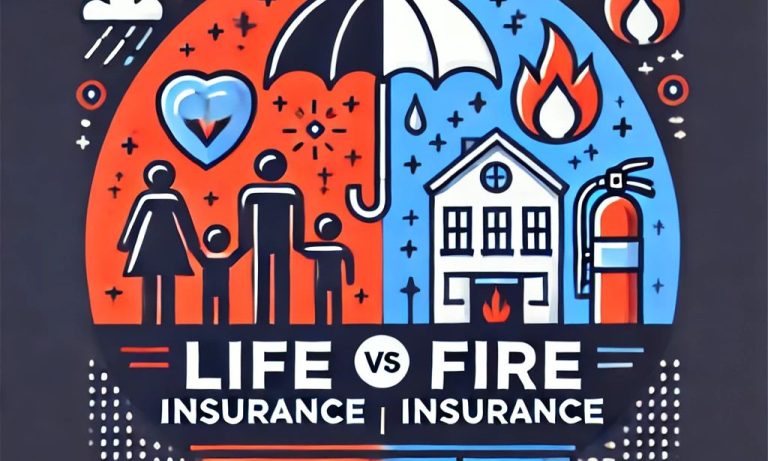Life insurance and fire insurance are two essential types of coverage that protect individuals and businesses in different ways. Life insurance ensures that your family or loved ones are financially supported if you pass away or become critically ill. Fire insurance, on the other hand, is designed to protect your property from damages caused by fire. Both types of insurance provide financial security, but they cover different aspects of life. In this article, we will explore the details of life insurance and fire insurance, their differences, and their respective benefits.
What is Life Insurance?
Life insurance is a financial product that offers a payout to beneficiaries in the event of the policyholder’s death or serious illness. The primary purpose of life insurance is to provide financial protection to loved ones, covering living expenses, debts, and other financial obligations after the policyholder’s passing. Depending on the type of policy, life insurance may also offer a savings component or investment benefits, providing the policyholder with both life coverage and an opportunity for growth in their funds.
There are different types of life insurance, each serving distinct needs:
- Term Life Insurance: This policy provides coverage for a specified period, and the payout is made only if the policyholder dies within that term.
- Whole Life Insurance: A permanent policy that covers the policyholder for life and builds cash value over time.
- Universal Life Insurance: Similar to whole life insurance but with flexible premiums and coverage amounts.
- Endowment Policies: These policies combine life coverage with a savings plan, where the policyholder receives a lump sum after a specific term or in case of death.
Benefits of Life Insurance
- Financial Security: Provides financial support to your family in case of your death.
- Debt Repayment: Helps cover outstanding debts, such as mortgages or loans, preventing your family from bearing the burden.
- Wealth Building: Some life insurance policies help build cash value or savings over time.
- Tax Benefits: Life insurance policies often come with tax advantages, including tax-free death benefits.
What is Fire Insurance?
Fire insurance is a type of property insurance that covers damages caused by fire. It protects the property and its contents from losses due to fire, which can be devastating for homeowners, businesses, and other property owners. Fire insurance may also cover damages caused by lightning strikes, explosions, and other risks associated with fire-related incidents.
- Property Coverage: Fire insurance typically covers buildings, furniture, equipment, and other property from fire damage.
- Business Interruption: Some fire insurance policies also offer coverage for the loss of income caused by the interruption of business operations due to fire damage.
- Additional Risks: Fire insurance may also cover damages caused by natural disasters like lightning or man-made incidents like explosions.
Benefits of Fire Insurance
- Property Protection: It helps repair or replace damaged property after a fire.
- Business Continuity: For businesses, fire insurance helps ensure operations continue after a fire, covering lost income during repairs.
- Peace of Mind: Property owners can feel secure knowing they are protected against the high cost of fire damage.
Difference Between Life Insurance & Fire Insurance
Although life insurance and fire insurance are both forms of coverage, they serve different purposes and protect against different risks. Here are the key differences between the two:
Purpose of Coverage
- Life Insurance: The primary purpose of life insurance is to provide financial support to your family or beneficiaries in case of your death or critical illness.
- Fire Insurance: The purpose of fire insurance is to protect your property from fire-related damages. It covers the physical structure of buildings and the contents inside them.
Type of Risk Covered
- Life Insurance: Life insurance covers personal risks such as death, illness, and disability.
- Fire Insurance: Fire insurance covers property risks, specifically damages caused by fire, lightning, explosions, or other fire-related incidents.
Beneficiaries
- Life Insurance: The beneficiaries of life insurance are typically family members or loved ones. They receive the payout to cover living expenses, debts, and other financial needs after the policyholder’s death.
- Fire Insurance: The beneficiaries of fire insurance are property owners, whether individuals or businesses, who receive compensation for repairs or replacements of their damaged property.
Duration of Coverage
- Life Insurance: Life insurance can be temporary or permanent. Temporary life insurance, such as term life, lasts for a specified period, while permanent life insurance lasts for the policyholder’s entire lifetime.
- Fire Insurance: Fire insurance is typically an annual policy that needs to be renewed each year. The coverage is provided for a specific property and can be adjusted if the property value changes.
Premium Structure
- Life Insurance: Premiums for life insurance are based on factors such as the policyholder’s age, health, and the type of coverage selected. Older individuals or those with health conditions may pay higher premiums.
- Fire Insurance: Premiums for fire insurance are based on the value of the property being insured, the location, and the level of coverage chosen. Properties in high-risk areas (like near forests or with high crime rates) may have higher premiums.
| Aspect | Life Insurance | Fire Insurance |
| Purpose | Provides financial support for family | Protects property from fire damage |
| Risk Covered | Death, illness, disability | Fire, lightning, explosions |
| Beneficiaries | Family members or loved ones | Property owners or businesses |
| Duration of Coverage | Temporary or permanent | Typically annual, renewable |
| Premium Calculation | Based on age, health, and coverage | Based on property value and risk |
Conclusion
In conclusion, life insurance and fire insurance are both valuable tools for managing risks but serve different purposes. Life insurance focuses on protecting individuals and their families in the event of death, illness, or disability, while fire insurance safeguards property and belongings from fire-related damages. Understanding the differences between the two can help you choose the right insurance based on your needs. Whether you are looking to protect your loved ones or secure your property, both life insurance and fire insurance offer essential financial protection.
Life Insurance vs Marine Insurance FAQs
What is the difference between life insurance and fire insurance?
Life insurance provides coverage for death, illness, and disability, while fire insurance protects property from fire-related damages.
How does life insurance work?
Life insurance provides a payout to beneficiaries if the policyholder dies or becomes critically ill, offering financial support during tough times.
What is covered under fire insurance?
Fire insurance covers property damage caused by fire, lightning, explosions, and other related incidents, helping replace or repair damaged property.
Can life insurance and fire insurance be combined?
Yes, you can have both life insurance and fire insurance to protect yourself and your property from different risks, though they are separate policies.
How are premiums for life insurance and fire insurance calculated?
Life insurance premiums depend on age, health, and coverage, while fire insurance premiums are based on property value, location, and risk factors.


